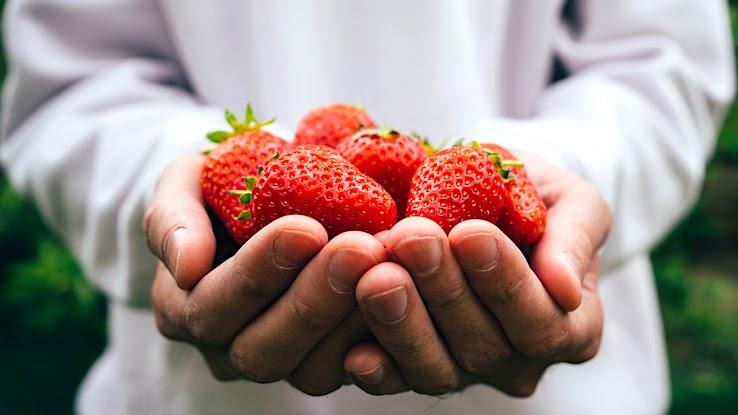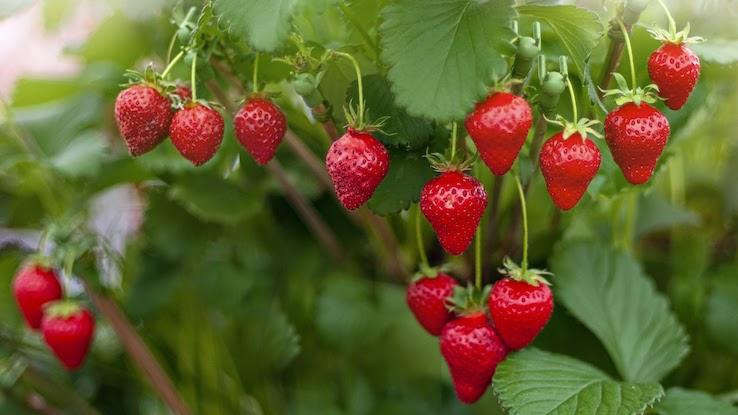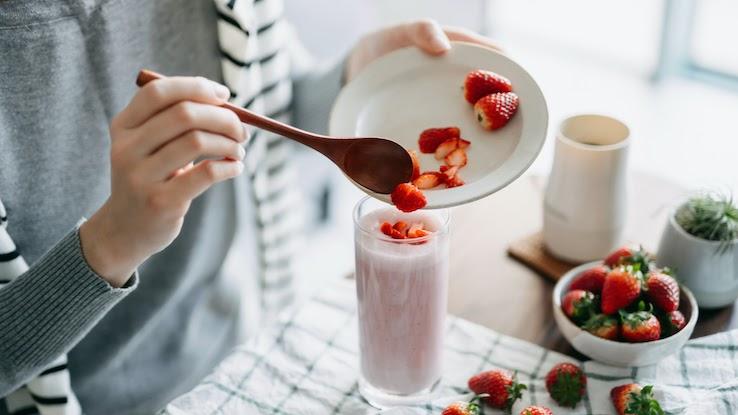
One of the most popular and well-known berries is the strawberry. Not only is this fruit a very popular artificial flavor in many candies and drinks, but it’s also commonly used as an accompaniment to desserts — and the fresh, real fruits make for a healthy snack or dessert by themselves.
Luckily, these berries are as healthy as they are bright and delicious. If you’re thinking about incorporating more strawberries into your diet, learning about their ample health benefits will convince you to start snacking.
Strawberries Are Rich in Nutrients
One of the best qualities of strawberries, aside from their delicious taste, is that they’re packed with vitamin C and other nutrients. These are some of the important vitamins and minerals found in strawberries:

- Vitamin C: This vitamin is crucial for boosting your immune system and reducing your risk of stroke, certain types of cancer, and high cholesterol and blood pressure. Additionally, it can even help with diabetes by regulating blood sugar levels.
- Folate: This nutrient is essential in ensuring a safe pregnancy, maintaining healthy red blood cells and helping to prevent heart disease.
- Potassium: This mineral is an electrolyte your body requires for normal cell function, proper nerve transmission, muscle contraction and kidney function. It can also help lower your risk of heart attack and stroke.
- Dietary fiber: Not only can fiber help relieve constipation, but it also stabilizes blood sugar, regulates digestion and helps lower “bad” LDL cholesterol levels.
Other trace nutrients that are not as abundant, but still present, in strawberries include:
- Calcium
- Iron
- Magnesium
- Phosphorus
- Sodium
- Zinc
- Copper
- Manganese
- Selenium
- B-complex vitamins
- Vitamin E
These Berries Also Contain Phytonutrients
Phytonutrients are chemicals produced by plants, such as fruits and vegetables, that have antioxidant and anti-inflammatory benefits. In addition to their myriad other nutrients, strawberries contain many phytonutrients, which is why this fruit is often called an antioxidant powerhouse. These are some phytochemicals and antioxidants that strawberries pack:

- Ellagic acid: This phytochemical reduces inflammation in the body, improves glucose metabolism and prevents the breakdown of collagen in skin, thus warding off wrinkles. It also has protective effects on your liver and boasts anticancer properties.
- Flavonoids: These phytochemicals are associated with reduced risks of cancer, cardiovascular diseases and Alzheimer’s disease. Some flavonoids that strawberries are rich in include:
- Anthocyanins: These antioxidants, which give strawberries their red color, have anticancer properties because they neutralize cancer-causing free radicals. They’re also anti-inflammatory and have been shown to alleviate symptoms in arthritis patients.
- Quercetin: This phenolic compound inhibits infection, promotes mental and physical performance and has anticancer properties. It also provides cardiovascular benefits.
- Kaempferol: This polyphenol antioxidant has been shown to have many beneficial effects against cardiovascular diseases, cancer, liver injury, obesity and diabetes.
- Catechin: This natural phenol is an antioxidant that protects against infection, cancer, obesity, diabetes and cardiovascular diseases. It also promotes a healthy liver and healthy nervous system function.
Eating Strawberries Offers Long-Term Health Benefits
Eating strawberries long-term can most definitely yield rewarding health benefits. These include:

- Improved heart health: Many clinical and epidemiological studies have demonstrated that consuming the compounds found in strawberries, such as phytonutrients and micronutrients, results in reduced cardiovascular risk. Flavonoids have anticoagulant properties, and consuming them daily can help prevent blood clots, which can lead to stroke. Additionally, potassium and folate, which are present in strawberries, also help lower the risk of heart attack and stroke.
- Improved metabolism: Several active components of strawberries have been shown to boost metabolism. Furthermore, eating strawberries has been linked to improved glycemic control and reduced risks of metabolic disorders, including diabetes and obesity.
- Anti-aging properties: The USDA Human Nutrition Research Center on Aging found that eating strawberries can help slow the decline of motor and cognitive skills related to aging. The abundance of phytonutrients and antioxidants has also been shown to fight signs of skin aging, such as wrinkles and sun damage. Strawberries have even been linked to decreased cases of cataracts, an eye condition related to aging and sun.
- Boosted immunity: One cup of strawberries can satisfy your daily intake of vitamin C, which is vital for a healthy immune system. Snacking on these fruits will strengthen your immune system to fight off the common cold, flu and other diseases and infections.
- Anticancer properties: Antioxidants present in the fruit, such as anthocyanins, neutralize free radicals that can cause cancer. Because internal body inflammation has been linked to cancer, the anti-inflammatory properties of strawberries also help to ward off cancer.
- Reduced internal body inflammation: Studies have shown that this fruit lowers the levels of C-reactive protein, which inflames your body and can lead to various health problems. Such anti-inflammatory properties are not only good for cardiovascular health, but they can also decrease episodes of rheumatoid arthritis and lupus flare-ups.
Interesting Facts About Strawberries
The health benefits of strawberries are clear, but you might also be interested to learn some lesser-known facts about these tasty fruits.

- Strawberries are a member of the rose family and are the first fruit to ripen in the spring.
- The fleshy, red part of the fruit that you eat is actually the stem of the plant.
- Studies show that having an alcoholic drink made with strawberries, such as a cocktail with crushed fruit or a strawberry daiquiri made with the real thing, can boost the antioxidant potency of the fruits.
- A cup of strawberries provides 100% of your daily recommended amount of vitamin C and is only 55 calories.
- Frozen strawberries retain almost the same amount of nutrients as fresh ones, so you can store them easily for later use in smoothies.
- Strawberries are the only fruit with seeds on the outside. They can naturally brighten your teeth when you eat them because the seeds exfoliate your enamel.
Resource Links:
https://pubs.acs.org/doi/full/10.1021/acs.jafc.6b00857
https://fruitsandveggies.org/fruits-and-veggies/strawberries/
https://strawberryplants.org/strawberry-nutrition-facts/
https://www.californiastrawberries.com/whats-in-a-strawberry/
http://berryhealth.fst.oregonstate.edu/health_healing/fact_sheets/strawberries_facts.htm
https://www.livescience.com/52541-phytonutrients.html
https://journals.ashs.org/jashs/view/journals/jashs/132/5/article-p629.xml
https://www.ncbi.nlm.nih.gov/pmc/articles/PMC5613902/
https://www.ncbi.nlm.nih.gov/pmc/articles/PMC4808895/
https://www.ncbi.nlm.nih.gov/pmc/articles/PMC3601579/
https://www.spandidos-publications.com/10.3892/etm.2019.7886
https://www.ncbi.nlm.nih.gov/pmc/articles/PMC6384718/
https://www.ars.usda.gov/research/project/?accnNo=432922
https://www.aao.org/eye-health/news/vitamin-c-rich-foods-help-curb-cataracts
https://web.extension.illinois.edu/strawberries/facts.cfm
https://factslegend.org/20-interesting-strawberry-facts-that-will-surprise-you/





